Spring 2023
PHIL 1101 - Introduction to Philosophy (multiple sections)
Kas Saghafi
Gerald Azike
James Bahoh
Sam Munroe
Timothy Roche
Marda Kaiser-Rehnelt
Daniel Smith
Mary Beth Mader (honors)
Course Description
Introduction to critical exploration of such issues as knowledge, reality, consciousness
and the good life; readings from Plato, Descartes, Kant, Nietzsche, or more recent
sources.
PHIL 1102 - Introduction to Ethics (multiple sections; online courses available)
Steph Butera
Amit Sen
Bernardo Alba
Zachary Auwerda
Lindsey Stewart
Jessica Soester
Ashleigh Morales
Salman Khawaja
L. Manning Garrett (at Lambuth)
Course Description
Introduction to such social and ethical questions as, “What makes a happy life? What
justifies ideas of good and evil? How should we live with others? What is the role
of gender and race in society?” The subjects of justice, racism, and oppression, especially
as they figure into the American context, are highlighted.
PHIL 1611 - Elementary Logic (multiple sections; online courses available)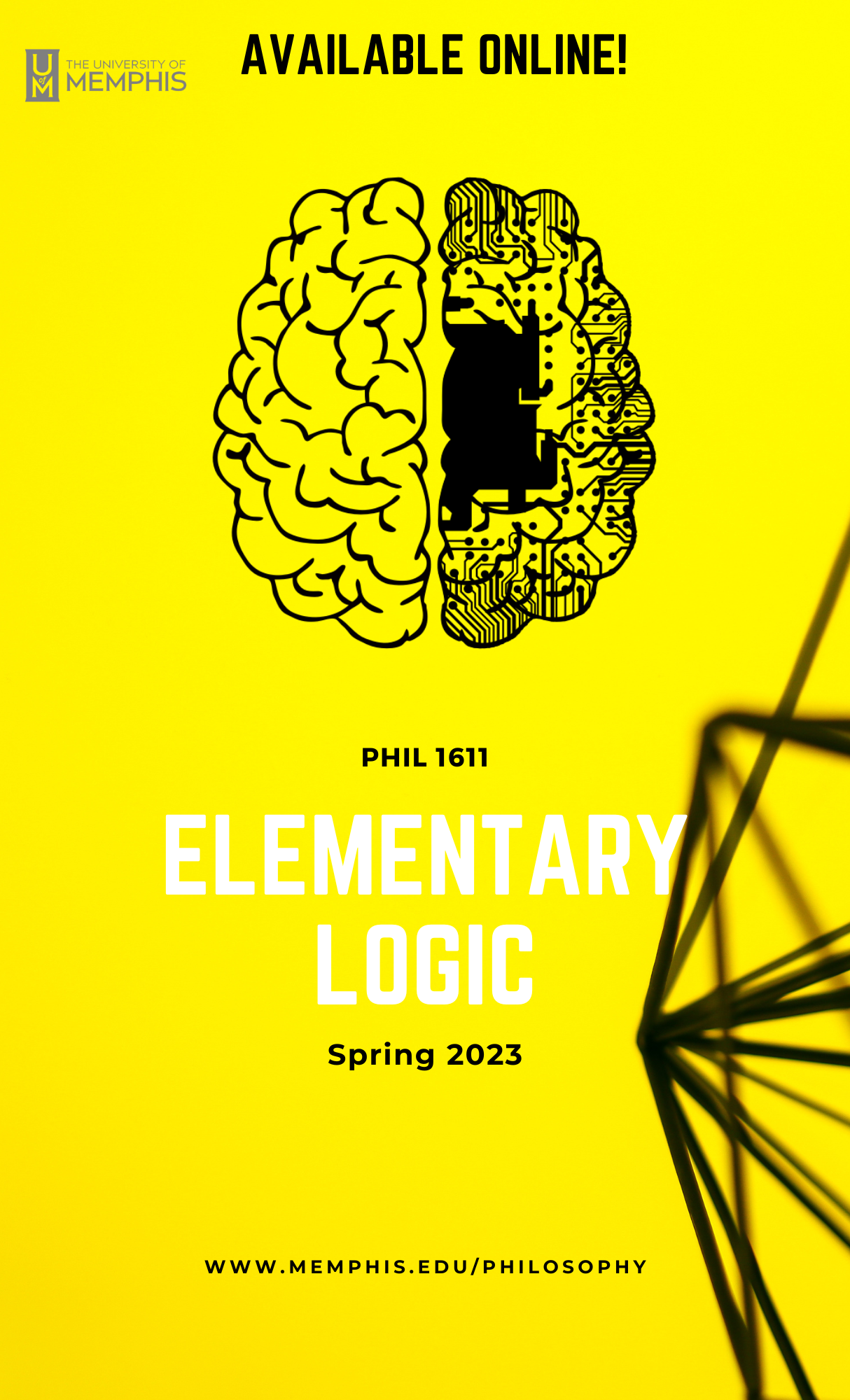
Amit Sen
Sila Ozkara
Course Description
In this course we will cover topics in both formal and informal logic. Studying logic
trains the mind to reason well. Logic has played a foundational role in education
for over two thousand years because reasoning well is essential to any intellectual
endeavor, whether it be in the sciences, the arts, or the humanities. We will explore
everyday uses of logic, historical systems of formal reasoning, and some modern formal
logic.
Required Textbook (M50 online versions; always consult your syllabus or instructor
before purchasing textbooks)
MindTapV2.0 for Hurley/Watson's A Concise Introduction Logic, 1 term Printed Access Card. 2019. ISBN: 9780357419410
PHIL 3002 - History of Modern Philosophy CRN 12088
CRN 12088
TR
9:40 - 11:05am
Daniel Smith
Course Description
History of philosophy from late Middle Ages through 19th century structured around
major themes that shaped the modern period; attention to cultural and historical setting
in which they arose and to which they contributed; readings from philosophical and
nonphilosophical sources.
PHIL 3451 - Existentialism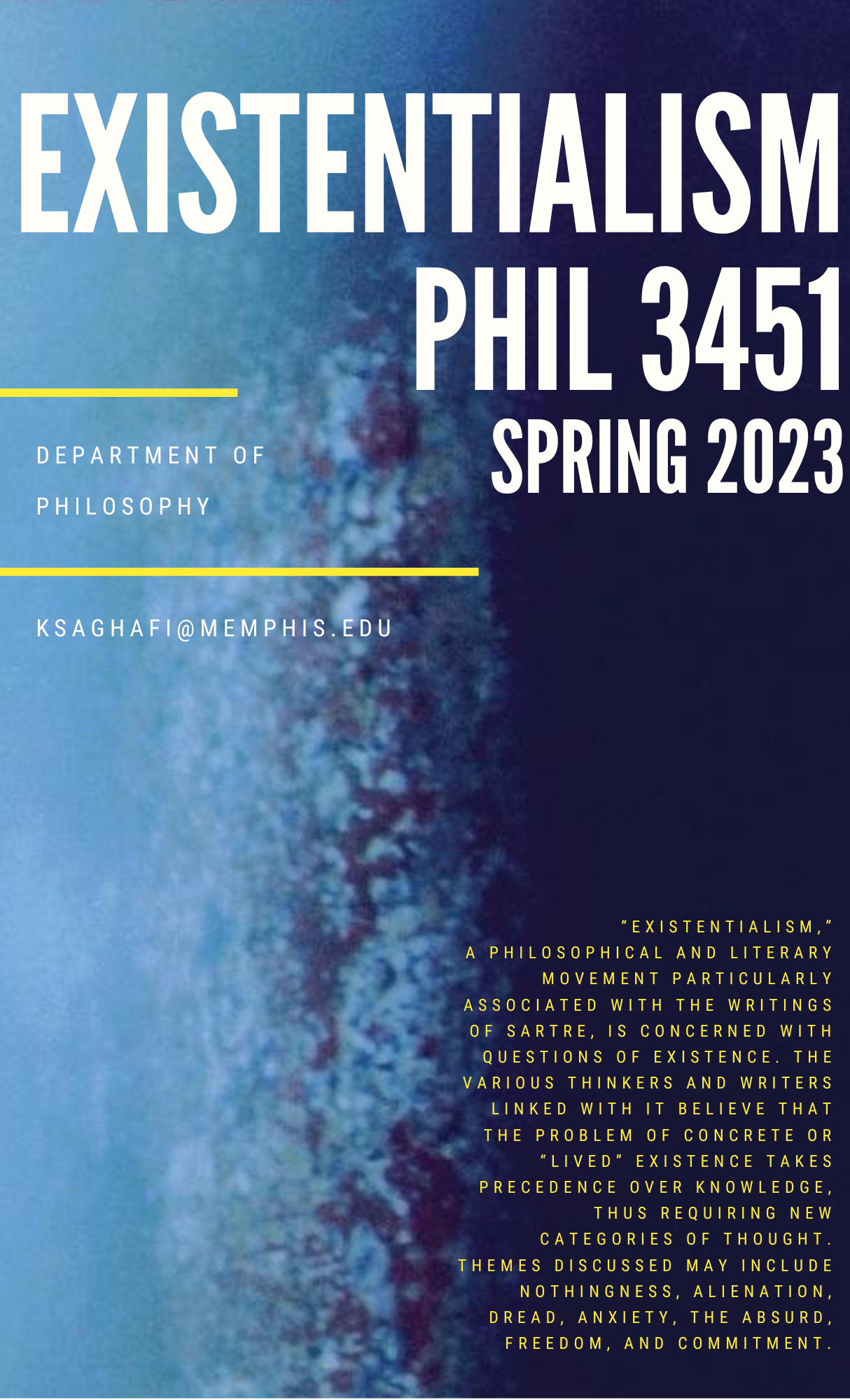
CRN 12089
MW
2:20-3:45pm
Kas Saghafi
Course Description
Historical and comparative study of different existentialist writers and their relation
to literature, religion, and psychology; readings from such writers as Kierkegaard,
Nietzsche, Jaspers, Heidegger, Sartre, and Camus.
PHIL 3452 - Feminist Theory 
CRN 12091
MW
12:40-2:05pm
Sila Ozkara
Course Description
Selected ideas from the history on women from the Greeks to the present; developing
methods and ideologies within contemporary theoretical approaches to feminist studies;
diversity, equality and difference discussed by drawing on different epistemologies,
such as existentialism and poststructuralism.
PHIL 3514 - Biomedical Ethics (multiple sections; online courses available)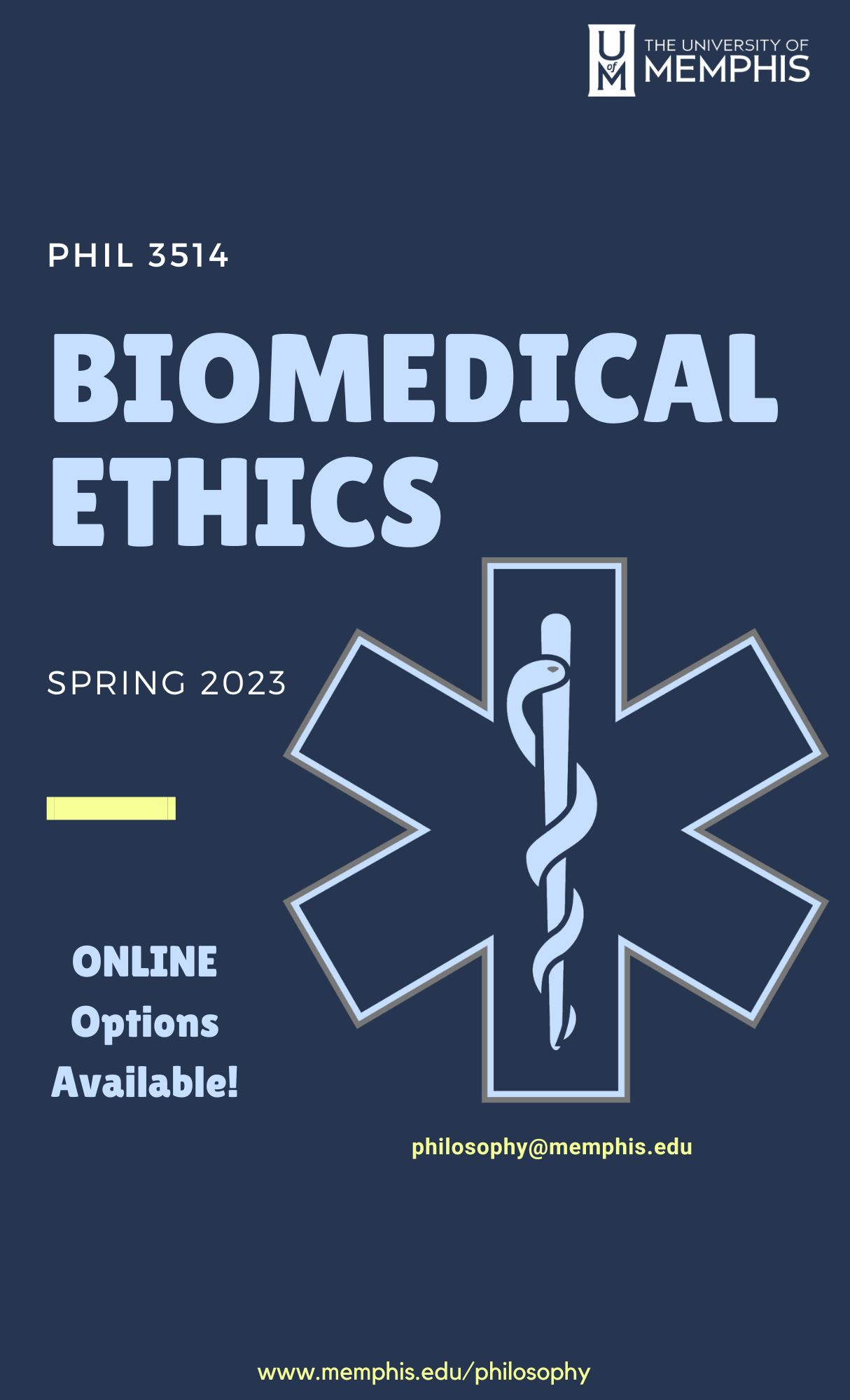
Kevin Taylor
Amy Nigh
Thomas Nenon
Salman Khawaja
L. Manning Garrett
Course Description
Discussion of ethical problems raised by contemporary medical practices and biological
innovations from standpoint of contemporary ethical theories including abortion, euthanasia,
human experimentation and genetic engineering.
Course Description (M50 online versions)
In this course we will begin by learning about moral theory, logic/argumentation,
and concepts related to biomedical ethics such as autonomy, paternalism, informed
consent, and more. We will then explore case studies in the modules that follow. Such
topics include human research, pandemic ethics, abortion, euthanasia, and health care.
You will be expected to apply moral theory to cases studies as well as identify relevant
concepts.
Required Textbooks (M50 online versions; always consult your syllabus or instructor
before purchasing textbooks)
Bioethics: Principles, Issues, and Cases by Lewis Vaughn (multiple editions available)
PHIL 3515 - Climate Change, Ethics, and Environment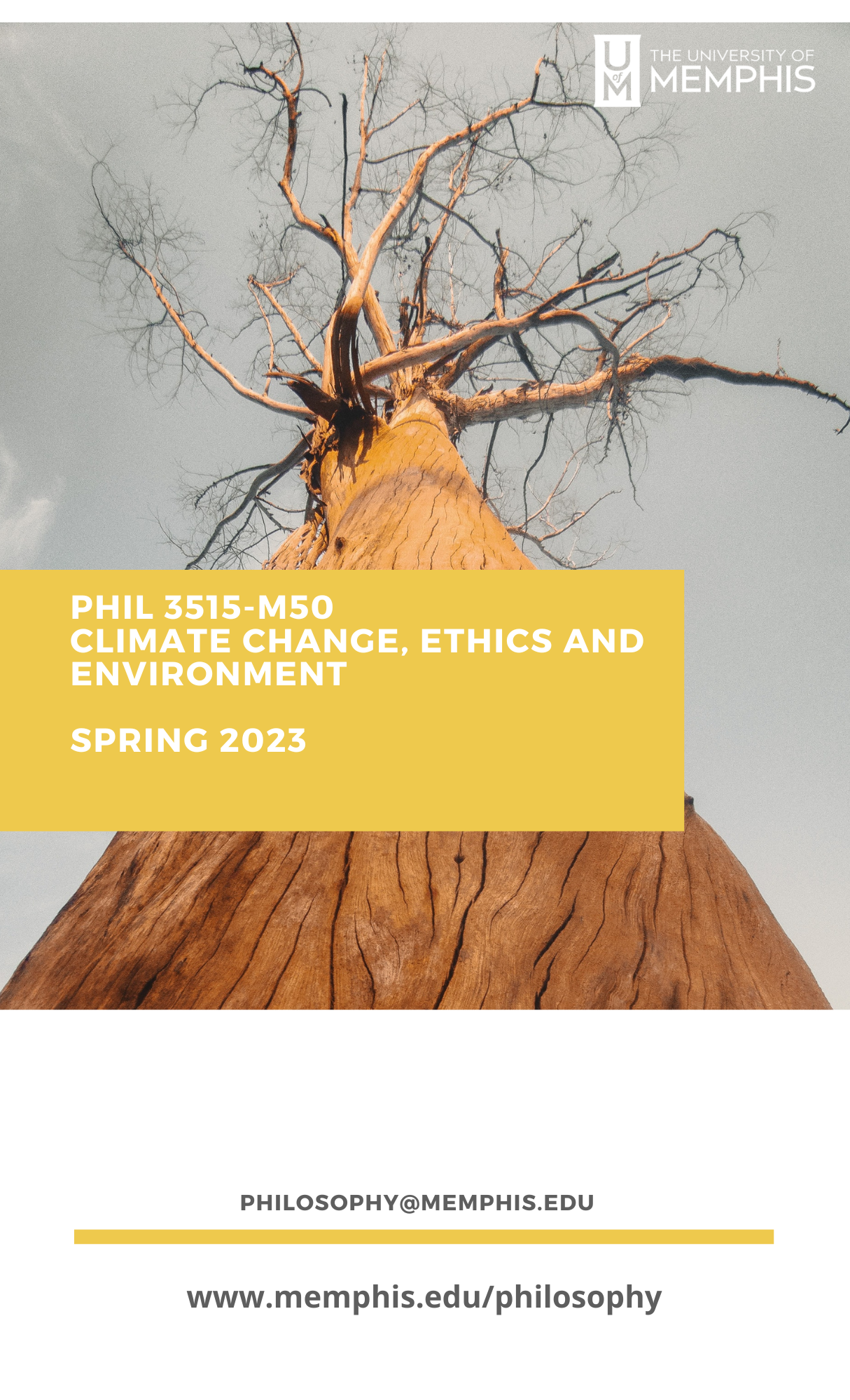
CRN 22050
ONLINE
Course Description
This course is intended as a survey of the topics addressed in environmental ethics:
non-anthropocentric ethics and the deep ecology movement, animal ethics and the use
of animals for biomedical research, ecofeminism, environmental racism, indigenous
environmental philosophy, social ecology, and the ethics of climate change economics
and technology.
PHIL 3516 - Philosophy of Law 
CRN 18994
TR
11:20-12:45pm
Remy Debes
Course Description
Philosophical analyses of nature and justification of law, legal reasoning, legal
institutions, practices such as punishment.
PHIL 3701 - Human and the Divine
CRN 12101
TR
1:00-2:25pm
Lindsey Stewart
Course Description
This course will examine one or more major religious movements regarding their origins,
doctrines, and philosophical significance; contrasting conceptions of deity, worship,
and the role of religion in how we think about ourselves and our roles in society
according to race, class, and gender.
PHIL 4823-M50 - ST: Confucianism 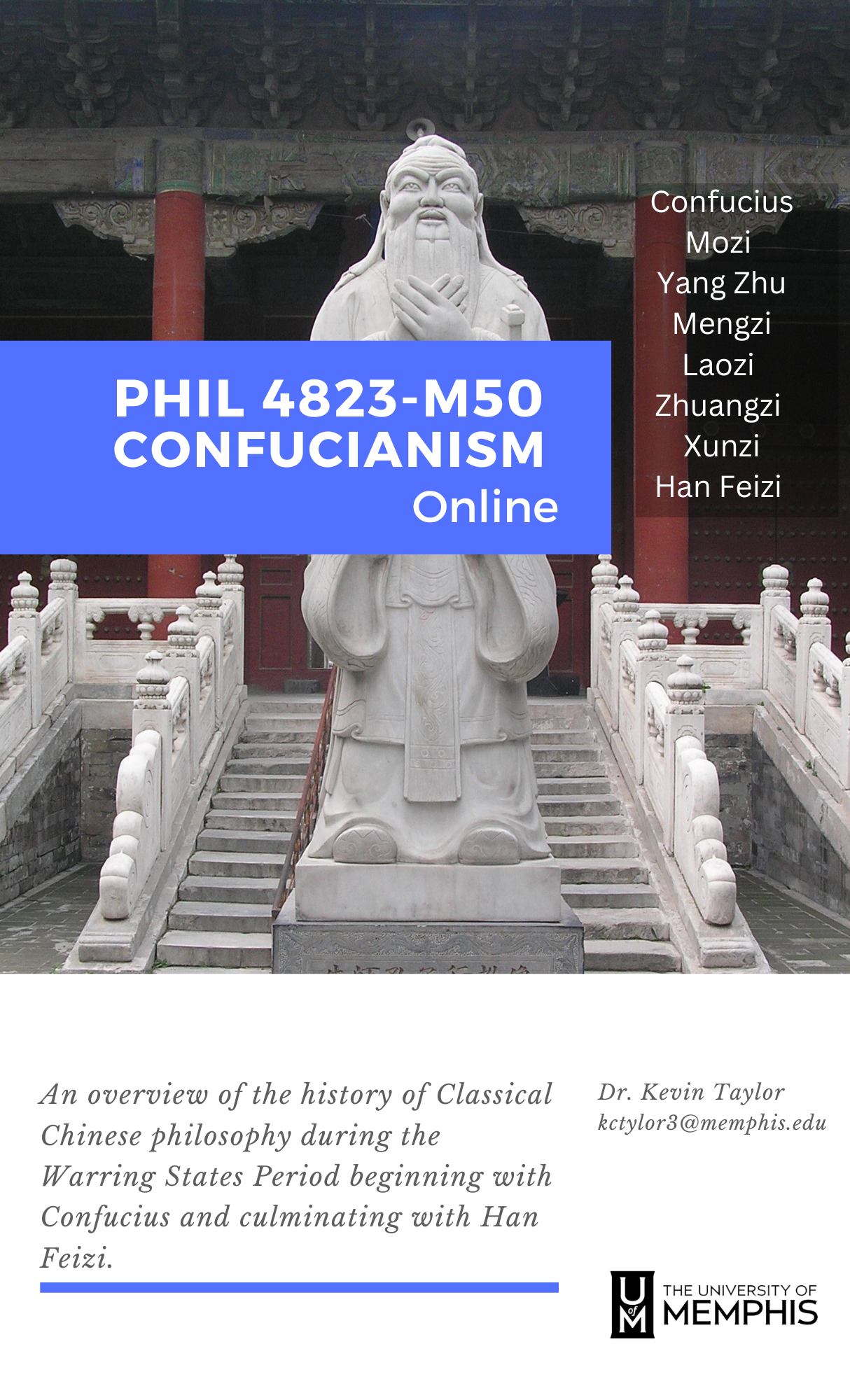
CRN 28687
ONLINE
Kevin Taylor
Course Description
This course will provide an overview of the history of Chinese philosophy with an
emphasis on Confucianism. We will focus primarily on the “classical period” of Chinese
philosophy which developed during the seminal Warring States Period in Chinese history.
This period begins with Confucius and culminates with Han Feizi at the end of the
Warring States Period and the beginning of the Qin Dynasty.
Every week we will explore a specific topic related to Confucianism whether that be methodology and historical context or individual figures such as Kongzi (Confucius), Mengzi (Mencius), or Xunzi (Hsun Tzu), or even figures opposed to Confucian thought such as Laozi (Lao Tzu), Zhuangzi (Chuang Tzu), or Han Feizi (Han Fei Tzu). By the end of the semester, you will be expected to identify the basic traits of Confucian thought, recognize the distinctive traits of competing schools of thought from within the Warring States Period, and understand the relevance of Chinese thought today.
Required Texts
Philip J. Ivanhoe and Bryan W. Van Norden, trans., Readings in Classical Chinese Philosophy, 2nd ed. (Indianapolis: Hackett Publishing, 2005). *Please note this text is available
as an ebook via the University of Memphis Library.
Edward G. Slingerland, trans., Confucius: Analects, with Selections from Traditional
Commentaries (Indianapolis: Hackett Publishing, 2003).
Bryan W. Van Norden, Introduction to Classical Chinese Philosophy (Indianapolis: Hackett
Publishing, 2011).
PHIL 4211/6211 - Studies in Ancient Philosophy: Ancient Greek and Roman Moral Psychology
<History>
CRN 12106/12118
TR
1:00-2:25pm
Timothy Roche
Course Description
The course involves the study of the Platonic, Aristotelian, and Stoic theories in
moral psychology. We examine, compare, and contrast their views on such topics as
desire for good, moral motivation, pleasure and pain, weakness of will, moral reasoning,
moral decision, moral responsibility, moral identity, moral action, moral character,
moral evil, moral development, moral emotion, division (or lack of division) of the
soul, psychological and ethical eudaimonism, and the natures of happiness and unhappiness.
Texts
TBD.
Course Requirements
Regular attendance and participation in class discussions, a midterm paper (or class
presentation), and a final research paper.
PHIL 4421/6421 - Philosophy of Mind
<Theoretical>
CRN 21386/21387
Monday
2:30-5:30pm
Shaun Gallagher
COURSE DESCRIPTION
The course will cover some of the major issues and debates in recent philosophy of
mind. We’ll begin with some historical background and examine basic concepts and standard
cognitivist views. Topics include reductive, non-reductive, and eliminative versions
of materialism; functionalism; notions of representation; computational models; mental
causation; action, free will, notions of self, and more recent 4E (embodied, ecological,
enactive and extended) models of the mind.
PHIL 7020/8020 - Seminar in Major Figures: Kant’s Practical Philosophy
<History>
CRN 12123/12131
Monday
5:35-8:35pm
Thomas Nenon
COURSE DESCRIPTION
This course will provide an introduction to and critical analysis of Kant’s major
works in moral philosophy, namely the Groundwork for a Metaphysics of Morals, Critique
of Practical Reason, and Metaphysics of Morals, along with selected passages from
Religion within the Bounds of Reason Alone.
The primary work in the class will center around close readings and critical discussion
of these works against the background of a few key interpretive issues raised in the
secondary literature on them.
Texts
No specific translations will be required. The three main texts are collected together
in one volume as Kant, Practical Philosophy, translated by Mary Gregory in the Cambridge
Edition. You may use any translation (or German edition) you choose as long as it
has the Akademie-Ausgabe pages listed in the margins so we can literally get on the
same page.
Course Requirements:
Regular attendance and extensive reading. A mid-term and a final paper, with the paper
weighted slightly more highly than the mid-term. One in-class presentation as part
of a team that will lead the discussion for one half session sometime during the second
half of the semester.
PHIL 7030/8030 - Seminar: Continental Philosophy (Heidegger's Critique of Metaphysics).
<Theoretical>
CRN 12125/12132
Thursday
2:30-5:30pm
James Bahoh
COURSE DESCRIPTION
This seminar will focus on Martin Heidegger’s critique of metaphysics. Heidegger portrayed
metaphysics as a powerful but deeply flawed historical, conceptual, and programmatic
framework, a framework in which all those under the purview of Western discourse live,
act, and think. Philosophically, this portrayal defines a set of tasks he argues are
necessary: to radically problematize the foundations of metaphysics, to rethink them
in terms of a bettergrounded ontology, and thereby to develop revisionist accounts
of things like the nature of human existence, our social worlds, history, thought,
death, time, being, ground, identity, and so on. His assessment of problems with metaphysics,
moreover, has played a major role in shaping many philosophical ideas and goals at
issue in a large section of continental philosophy from the 1920s to today. We will
read and critically evaluate a variety of Heidegger’s shorter texts and excerpts that
address metaphysics, specific metaphysical concepts, or significant historical metaphysical
systems. These texts will range from his early work in the 1920s to his late work
in the 1960s and early 1970s. We will aim to gain clarity about (1) what exactly Heidegger
means by the term “metaphysics,” (2) some core problems with metaphysics that he identifies,
and (3) the position of metaphysics relative to Heidegger’s methodology. We will also
(4) look a bit into Heidegger’s approaches to solving some of these problems and (5)
work to evaluate whether or not his critiques are convincing.
TEXTS
We will read a variety of roughly article-length texts and excerpts by Heidegger.
I will post these on Canvas. Since it will be an important point of reference, I would
recommend acquiring a paper copy of Being and Time, trans. John Macquarrie and Edward
Robinson (New York: Harper and Row, 1962).
REQUIREMENTS
Class participation (includes preparing at least one protocol), a short paper due
before the middle of the term, and a 5,000-8,000-word research paper. Protocols: on
a rotating basis, each week one student will be tasked with writing a condensed two-page
summary of our class discussion. The following week, this protocol will be read at
the beginning of the session.
PHIL 7541/8541 - Social/Political Philosophy: Social Identity, Phenomenology, and
Liberation
<Practical>
CRN 18167/18168
Tuesday
2:30-5:30pm
Michael Monahan
COURSE DESCRIPTION
Current debates surrounding social identities tend to revolve around the relation
between categories such as race, gender, or sexuality (among others) and the status
of such categories as “natural.” Whether they are natural (often understood as biological)
or a mere social construct sets the stage for much of the debates about the moral
and political merits of social identities and their relation to oppression and projects
of liberation. If they are natural, then they are mind-independent parts of the physical
world, and if they are not, then they are cultural artifacts. Most of the current
work on these topics deals with the implications of social identities being cultural
constructions, and what this means for their role in our lives (both descriptively
and normatively). Phenomenology, however, draws our critical attention to the unquestioned
commitment to the nature/culture divide (Husserlian phenomenology, for instance, effectively
begins with a “bracketing” of the “natural attitude”). In calling to account this
neat division between the natural and the cultural, we unsettle the standard landscape
of these political debates in a profound way. This seminar will explore the implications
of this phenomenological approach by engaging with recent texts examining questions
of oppression, social identity, and liberation using the resources of the phenomenological
tradition.
TEXTS:
Sara Ahmed - Queer Phenomenology: Orientations, Objects, Others (Duke University Press,
2006)
Linda Alcoff - Visible Identities: Race, Gender, and the Self (Oxford University Press,
2005)
Helen Ngo – The Habits of Racism: A Phenomenology of Racism and Racialized Embodiment
(Lexington Books, 2017)
Mariana Ortega – In-Between: Latina Feminist Phenomenology, Multiplicity, and the
Self (SUNY Press, 2016)
Additional texts by Alia al-Saji, Sonia Kruks, Lewis Gordon, and George Yancy, among
others.
REQUIREMENTS:
Students will be assessed on class participation (including weekly online written
responses to the reading), one class presentation, and a final research paper (15-20
pages).
PHIL 7514/8514 - Cognitive Science Seminar- Agents: Why should they act?
CRN 21695/21696
Wednesday
2:20-5:20pm
Alistair Windsor
Title: Agents: Why should they act?
Description: In the field of Artificial Intelligence (AI), anything that can perceive its environment and act on that environment is called an agent (Russell & Norvig, 2020). In this view, humans, most living organisms, autonomous vehicles, and thermostats are agents. A key question to understand for the design of agent models is -- why do living organisms act? In AI, there are two leading theories that strive to answer this question: (1) to maximize expected reward (a.k.a. reinforcement learning), which is the dominant view in AI, and (2) to minimize the brain's prediction error (a.k.a. predictive coding or free energy principle). A number of other theories have been extensively researched in the natural and applied sciences. In this Cognitive Science Seminar course, we will discuss papers and invite speakers from AI, robotics, psychology, neuroscience, biology, and philosophy to understand the influential theories spanning over a century of research regarding why living organisms act.
Note: The course does not count as a class that fulfills Philosophy core course requirements.

